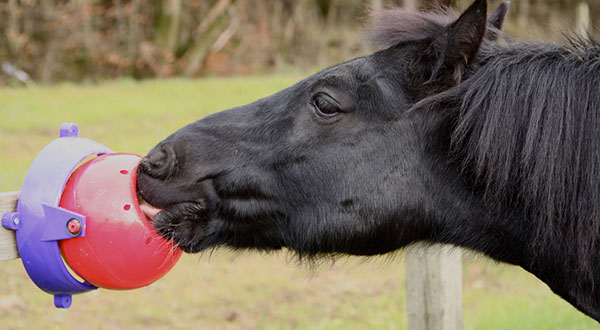
Scientifically proven to reduce cribbing
Summary of study conducted by Katherine Houpt, VMD, PHD of Cornell University 2011
Research undertaken at Cornell University, USA has proven that the Tongue Twister can significantly reduce the cribbing activity of horses that were confirmed as chronic cribbers.
These horses spent on average 23% of their time cribbing; that is about 5.5 hours in every 24!
Attempts were made to reduce cribbing activity by exercising the horses. However, this had no effect after 10 minutes of cantering. After 20 minutes this actually led to more cribbing outwith the exercise period-nearly 7.5 hours. Therefore, increasing the amount of exercise actually had a negative effect.
In contrast, licking the Tongue Twister effectively reduced cribbing activity by 27%!
Cribbing damages the incisor teeth by causing excessive wear, damages those wooden surfaces that the horse can crib on and it has been proposed that it can also increase the risk of colic. Cribbing activity indicates reduced welfare at some stage in the animal’s life that initiated the behaviour.
The reduction in cribbing activity has the following benefits:
1. Improved welfare through increased foraging activity.
2. Less damage to the horses’ teeth and stable.
3. Improved health.
It is important to note that the beneficial effect of the Tongue Twister was measured in horses with a fixated abnormal behaviour. Because the Tongue Twister encourages foraging activity in the stable it is quite possible that the likelihood of any horse or pony developing abnormal behaviours will be reduced. Thus, the welfare of any stabled horse or pony should be improved through the provision of a Tongue Twister.


